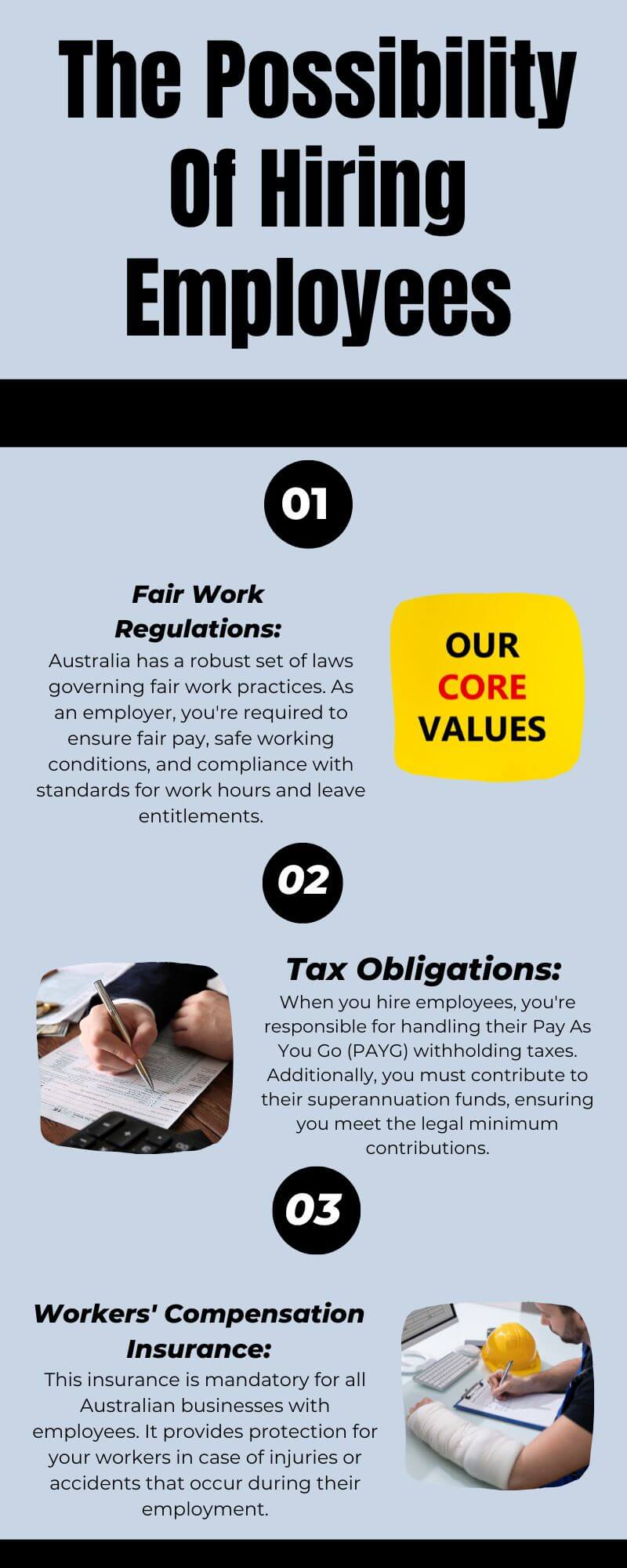In the vibrant business environment of Australia, the choice to operate as a sole trader is popular among many entrepreneurs. This preference stems from the simplicity and direct control that this structure offers. It allows individuals to start and run their businesses without the complexity of forming a company. However, this simplicity often leads to a critical question: Can a sole trader hire employees?
The Flexibility Of Sole Trader Status
Being a sole trader means you are the business. You’re responsible for all decisions, debts, and day-to-day management. This structure especially appeals to those seeking full control over their business operations and prefer a straightforward tax arrangement. The Australian business landscape values this flexibility, offering a welcoming environment for such entrepreneurial ventures.
The Possibility Of Hiring Employees
Contrary to a common misconception, being a sole trader doesn’t mean you have to work alone. In fact, hiring employees can be a strategic decision to foster business growth and expand operations.

Key Responsibilities When Hiring
As a sole trader, employing staff introduces a set of responsibilities you must adhere to:
- Fair Work Regulations: Australia has a robust set of laws governing fair work practices. As an employer, you’re required to ensure fair pay, safe working conditions, and compliance with standards for work hours and leave entitlements.
- Tax Obligations: When you hire employees, you’re responsible for handling their Pay As You Go (PAYG) withholding taxes. Additionally, you must contribute to their superannuation funds, ensuring you meet the legal minimum contributions.
- Workers’ Compensation Insurance: This insurance is mandatory for all Australian businesses with employees. It provides protection for your workers in case of injuries or accidents that occur during their employment.
Also Read: How Customisation Can Enhance Your Brand Image
Transitioning From Solo To Employer
Moving from being a sole operator to an employer is a significant change. It requires not just a shift in mindset but also a readiness in terms of business operations.
Preparing For Expansion
Before taking the leap to hire employees, it’s crucial to assess your business’s readiness. Questions to consider include whether you have enough consistent work to justify additional staff and if your financial footing is strong enough to support this expansion. Moreover, evaluate if your business processes are robust and scalable to manage a team effectively.
Leveraging Technology For Efficient Management
In today’s digital age, technology plays a pivotal role in managing a business efficiently. For sole traders transitioning to employers, leveraging the right tools is essential in handling the added complexities.

The Role Of SoleApp In Streamlining Operations
SoleApp, a product born from the need to provide efficient on-the-go financial tools for Australian businesses, stands out as a solution tailored for this market. This app caters specifically to the needs of sole traders and small businesses in Australia, making it an invaluable tool in the transition from working solo to managing employees.
How SoleApp Benefits Sole Traders And Small Businesses
SoleApp is designed to simplify several aspects of business management, including:
- Financial Management: It offers features for tracking expenses, managing invoices, and keeping a close eye on the financial health of your business. These capabilities are crucial when scaling up operations.
- Employee Management Features: While primarily focused on sole traders, SoleApp’s functionalities can be adapted to manage small teams. This includes tracking payments, managing schedules, and ensuring compliance with tax and superannuation obligations.
Also Read: How Mobile Invoicing Can Speed Up Your Payment Process
Navigating Legalities And Compliance
With employees on your team, understanding and navigating the landscape of employment laws becomes more important.
Understanding Employment Laws
Australia’s employment laws are designed to protect both employees and employers. As a sole trader employing staff, it’s imperative to familiarise yourself with these laws. This includes understanding employee rights, obligations towards your staff, minimum wage compliance, and workplace health and safety regulations. Ignorance of these laws is not a defence; non-compliance can lead to significant legal and financial repercussions.

The Financial Implications
Bringing employees into your business has substantial financial implications. Apart from their salaries, there are additional costs such as superannuation contributions, taxes, and insurance.
Budgeting For Growth
Effective financial planning and management are crucial to accommodate these added expenses. This is where tools like SoleApp become invaluable. By providing a clear view of your financial position, the app helps in making informed decisions about hiring and managing your workforce.
Balancing Autonomy And Team Management
As a sole trader transitioning to an employer, one of the significant shifts involves balancing personal autonomy with the responsibilities of managing a team.
Adjusting To A New Role
The transition from working independently to managing employees requires a new set of skills and a different mindset. As a business owner, your role now includes mentorship, delegation, and leadership. Developing these skills is crucial to maintaining a productive and harmonious work environment. Effective communication, setting clear expectations, and understanding team management dynamics are key to this successful transition.
Implementing Effective Systems And Processes
With the addition of employees, implementing structured systems and processes becomes essential to ensure smooth operations.
Streamlining Workflow
Creating efficient workflows and standardised processes helps in managing tasks more effectively. This includes setting up systems for task allocation, performance monitoring, and feedback mechanisms. Technology plays a critical role here, with tools like SoleApp providing a platform to manage financial aspects seamlessly, allowing you to focus on optimising operational processes.
Also Read: Digital Bookkeeping Guide For Australian Sole Traders
Cultivating A Strong Business Culture
As you grow from a sole trader to an employer, fostering a positive business culture becomes increasingly important.

Building A Supportive Environment
The culture of your business will significantly impact employee satisfaction and retention. Establishing values that resonate with your vision and ensuring these are reflected in your business practices creates a cohesive and motivated team. Celebrating successes, encouraging open communication, and providing opportunities for professional growth are ways to build a strong, supportive business culture.
Conclusion: Embracing Growth As A Sole Trader
In conclusion, being a sole trader in Australia offers a unique blend of simplicity and flexibility. Hiring employees under this structure is possible and can be a pivotal step in growing your business. With proper planning, an understanding of legal and compliance requirements, and the support of technological tools like SoleApp, you can successfully transition from a solo entrepreneur to a thriving business owner with a productive team. The journey from being a sole trader to becoming an employer is one of growth and opportunity, and with the right resources, it’s a journey that can lead to significant success.


